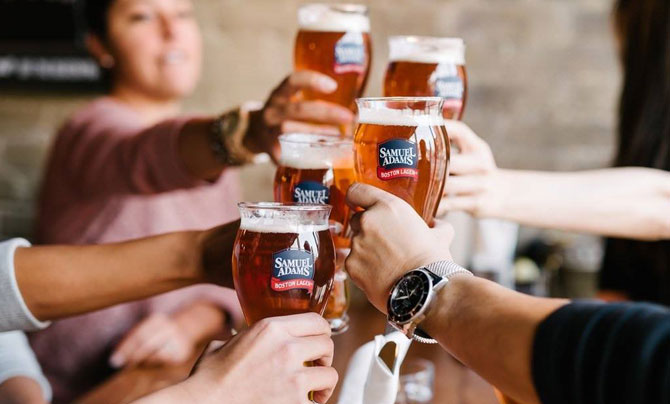
After two years of dabbling in the “hazy IPA” space with its Rebel Raw offering, Boston Beer Company is finally making a nationwide bet on a growing trend that started in its own backyard.
In its third quarter earnings report, released yesterday, Boston Beer noted depletions and shipment declines of 3.5 and 4 percent respectively, as it continues to face challenges from nearly 6,000 craft breweries that are chipping away at the company’s market share.
However, Boston Beer and its executives are already looking ahead to 2018 and projecting depletion and shipment increases in the low-single digits.
How the company — which makes the Samuel Adams, Angry Orchard Hard Cider, Twisted Tea, and Truly Spiked & Sparkling seltzers lines — gets there was discussed during an earnings call question-and-answer session with analysts on Thursday evening.
For starters, Boston Beer announced several new offerings that the company is hoping will help stabilize its core brands — Samuel Adams and Angry Orchard — in 2018.
In an effort to capitalize on the growing consumer shift toward cloudy, “New England-style IPAs,” the company will embark on a nationwide launch of its own Samuel Adams New England-style IPA, which has been sold in limited quantities throughout the Boston area for a “couple of months,” according to brewery founder Jim Koch.
Koch characterized the New England IPAs as different than more widely-available West Coast IPAs, due to their juicy taste, hazy appearance and “shelf-life issues and physical stability issues.”
“It’s almost like a unicorn,” he said. “You hear about it, but you can’t find it.”
According to Koch, IPAs currently make up about 33 percent of craft beer volumes, or about 7 million barrels.
“So, taking even a mid-single digit piece of that is a meaningful piece of volume for a smaller company like Boston Beer Company,” he said.

The company is also hoping the nationwide launch of Sam ’76 lager will help offset declines. Koch said that offering, which was unveiled during a media breakfast at the Great American Beer Festival earlier this month, meets consumer, retailer and wholesaler needs for more beer occasions.
“There’s a drinker need for something that has craft flavor but more drinkability,” Koch said. “There’s a retailer need to increase the volume from their craft beer consumers. … And, of course, wholesalers love both the high margins of craft beer and the potential for additional volume.”
Meanwhile, under the Angry Orchard label, Boston Beer is planning to go after wine drinkers with a new rosé hard cider. Although it wasn’t discussed in much detail during the Q&A, the company said it is hoping the national launch of the product will “attract new drinkers to the category.” The move will put the company in competition with MillerCoors and Heineken, who have announced rosé-flavored cider releases in their Crispin and Strongbow lines, respectively.
Boston Beer CEO Martin Roper said the company sees “broad appeal” in the Truly Spiked & Sparkling brand, and it is working toward “unlocking” its potential.
“We’re obviously not there yet,” he said. “It’s starting off small and slow, and while it certainly helped this year, it’s not real material to our business but we would certainly like it to be. And we would like to maintain a leading position in it.”

To better compete in the hard seltzer category, Roper said Boston Beer will expand availability of Truly in cans and add new flavor profiles next year. He added that the company is working to secure more points of distribution for the brand, which the company doesn’t view as a “as sort of boom-splat” as previous hot category items, such as hard sodas.
“It fits in the health and wellness space that certainly, Michelob Ultra is benefiting from,” Roper said of being a low carb, low calorie alcoholic beverage.
But Roper may not be around to see if Boston Beer is able stabilize its performance, however. In February, the company first announced Roper’s plans to retire in 2018. During the call, several analysts questioned why the CEO search for his replacement has taken so long.
Koch said the company is taking advantage of Roper’s commitment to remain with Boston Beer until his replacement is identified and introduced. That has allowed the company time to search for a candidate who, he said, fits culturally as well as possesses “omni-competence” in roles such as sales, marketing, customer service and product quality.
“[W]e are not in a rush to go out and find somebody that doesn’t meet what are probably exceptionally high standards,” Koch said. “If we have to make a trade-off, I mean, somebody who can drive the top line is more important than operations. But we’re really looking for somebody who is good at all of those things.”
In a post-earnings call analysis, Cowen and Company’s Vivien Azer noted that Boston Beer’s marketing spend declined during the quarter. During the call, Roper said the company wasn’t “feeling it” in regards to the advertising spots that ran during the quarter.
“If you’re not feeling it, you don’t amp the investment up,” he said
Azer questioned the approach in her report, noting that Boston Beer appears to be using its marketing spend as “a large lever that SAM is leaning on to make numbers” and cautioned that the company’s brands, namely Boston Lager, “seem to really need investment support.”
Cowen maintained its stock rating of “underperform” for Boston Beer. Additionally, Goldman Sachs downgraded the company’s stock from “neutral” to “sell” in July.